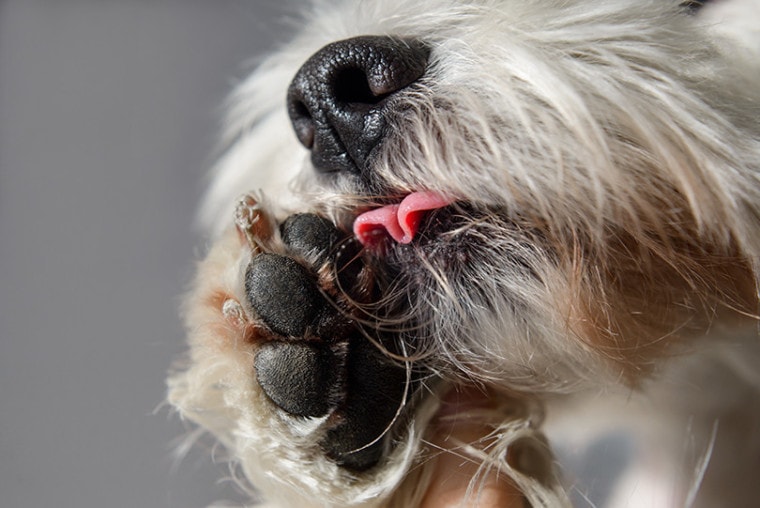
Understanding why our dogs do the things they do isn’t always straightforward. When it comes to dogs licking their paws, it doesn’t take long for the constant smacking of their tongue and lips to drive us up the wall. It only becomes more frustrating when you can’t seem to figure out why they’re doing this in the first place.
Occasional paw licking is normal for all dogs. Paw licking is a part of the grooming process, especially after coming in from outside. However, if your dog licks their paws frequently, it could be a sign that something is wrong.
The 9 Reasons Why Dogs Licks Their Paws
There are many different triggers for paw licking. Some are more severe, but often, it isn’t something to be worried about.
1. Injury
A dog that constantly licks their paws is sometimes in pain. Whether it be from a rash, sliver, or insect bite, there are many different things that could irritate them. If the licking is limited to a single paw, the source is likely located on that paw.
Don’t ignore their pain even if you don’t see anything. Most times, people can find what they’re looking for and remove it, but other times the object is lodged too deep, and they must be taken to the vet to get it removed.
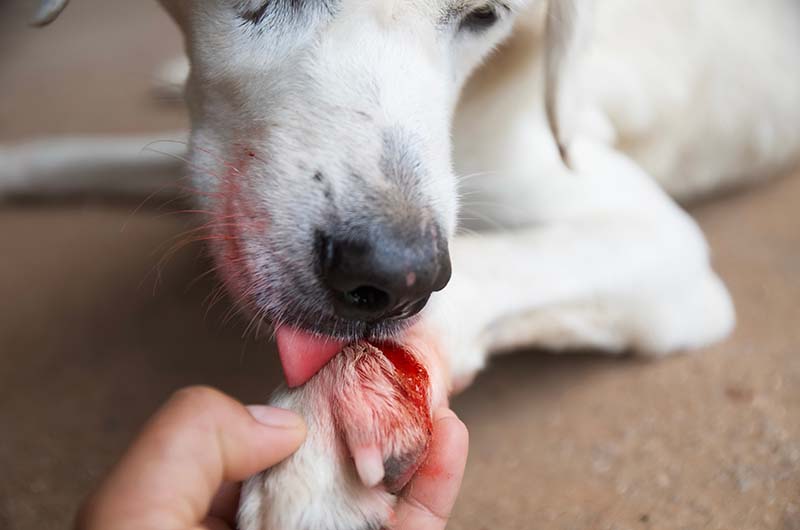
2. Allergies
Chronic licking is most often triggered by some sort of allergy. Dog allergies can come from almost anything. Their food, garden chemicals, cleaning products, and even grass are only some common examples. Try cleaning your pup’s feet with a wet wipe every time they come inside. It could take some time and patience to figure out what the reaction is from, so it’s best to have your vet perform a blood test to figure it out. They can also give your dog antihistamines to relieve the irritation.
3. Boredom
Modern society has created an environment that leaves dogs bored for hours on end. Many of us go to work for 8 hours a day and leave our dogs at home to fend for themselves. Historically, dogs had another purpose aside from being our companions. They were out hunting, scavenging, and guarding their territory. A bored dog could turn to licking and chewing their paws out of frustration. To keep your dog entertained, you could try one of the following:

4. Gastrointestinal Problems
It isn’t uncommon for dogs with gastrointestinal issues to obsessively lick their paws. Their issues could be making them feel uncomfortable, and licking their feet is a way to comfort themselves. Other signs of GI issues include vomiting, diarrhea, constipation, lack of appetite, dehydration, abdominal pain, and fever.
5. Anxiety
Dogs get anxious just like people do, and their only source of relief is to lick their paws. If your dog is licking their paws before a certain activity or before bed, this is a sign that they have anxiety. Anxiety could also be caused by boredom, depression, lack of proper exercise, spending too much time alone, and illness.

6. Hormonal Imbalance
Dogs with hormonal imbalances are usually producing too much cortisol. Too much cortisol could then cause Cushing’s disease. These types of issues often promote skin issues that lead to balding, red spots, and brittle fur. Licking these irritated areas is a way for your dog to soothe the pain. However, it could also lead to an infection.
7. Dry Skin
Dogs aren’t gifted with naturally moisturized skin. Some breeds have worse skin problems than others. If your dog has dry skin and won’t stop licking, it could be from their DNA, dry weather where you live, or even lousy grooming habits. Ask your veterinarian to recommend a natural dog lotion to relieve the dryness. Refrain from excessive bathing that tends to make the dry patches even worse.
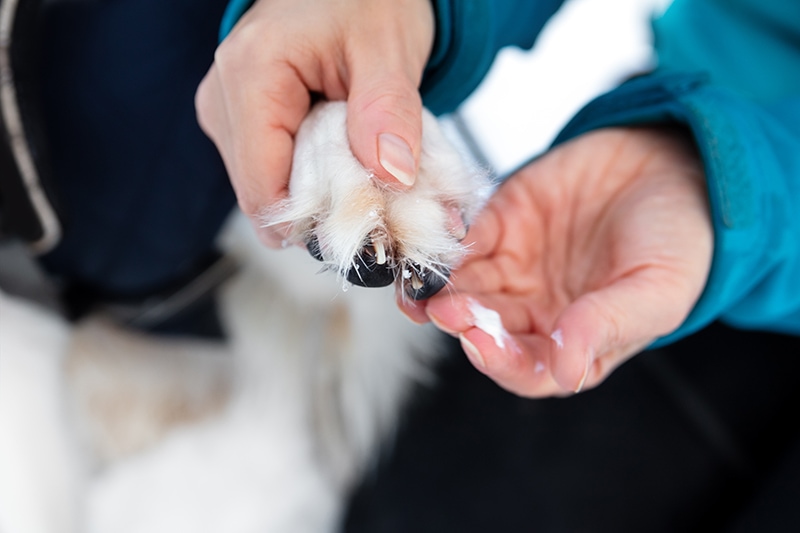
8. Fleas and Ticks
Flea and tick medication is incredibly important for the health of your dog. Their conditions only get worse if they have an allergy to either of these pests. Fleas and ticks can both cause paw itching, and they can be tough to find when they’re stuck in an area with all those dark crevices.
9. Cold Weather
Some dogs lick their paws more doing one season than another. Many dog owners find that the licking happens more during the winter. Ice balls may form between your dog’s hairy toes, and the cold weather can pull hair or cause cracking and bleeding. Deicing salts that we use to melt ice and snow on our driveways are another issue. These salts contain chemicals that could potentially burn your dog’s feet. Avoid letting them wander these areas when they are off a leash.

How to Stop Excessive Paw Licking (3 Ways)
Even if you can’t identify the reason for the behavior yourself, it’s important to stop them from doing it. We recommend taking your pet to the vet right away if you can’t determine a cause, but there are still ways to deter them until you’re able to get them in for an appointment.
1. Keep Their Paws Covered
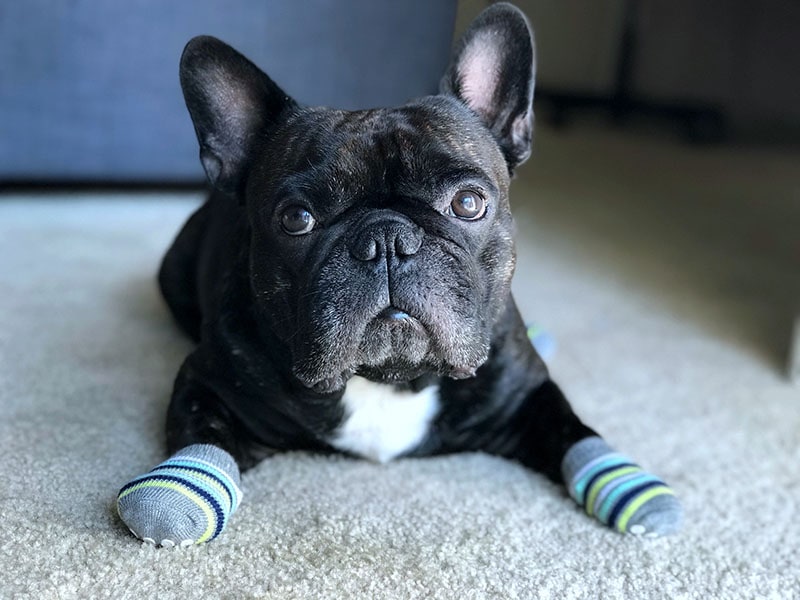
Dog boots and socks aren’t only for fashion purposes. Many dog owners use these products to protect their fur babies’ paws, and they can also be used to prevent them from licking. Simply slip a sock or bootie over their paws and hope that the licking stops. Of course, some dogs might not be able to resist chewing it off if the irritation is unbearable.
2. Use a Cone Collar
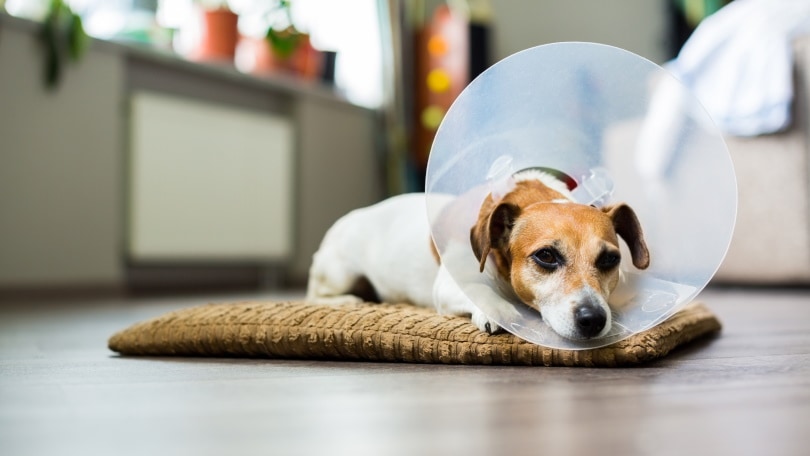
While this approach is a bit more extreme, cone collars are effective in preventing unwanted licking behaviors. Cone collars make it more difficult for dogs to lick or pick at a certain spot on their body. Despite being a little uncomfortable, it is a good option until you can take them to the vet.
3. Use Citrus Fruits to Your Advantage

Dogs don’t love the taste of citrus fruits. Applying a couple of drops of juice to the irritated paw could prevent them from going in for another taste. Instead of pouring it directly to the paw, try wrapping their feet in bandages first and then adding a few drops of lemon or grapefruit juice directly onto the dressing.
Final Thoughts
We know how annoying it can be to listen to your dog licking their paws for hours on end. You can try to ignore it, but the longer you wait, the more likely it is that the problem is going to get worse. If this behavior has been going on for a couple of days and you are unable to identify the cause yourself, make an appointment with the vet right away to figure out how to manage it.
See Also:
- Why Do Dogs Lick Blood? (6 Possible Reasons)
- My Dog Licked Triple Antibiotic Ointment! Vet Approved Advice
Featured Image Credit: Julia Serdiuk, Shutterstock






